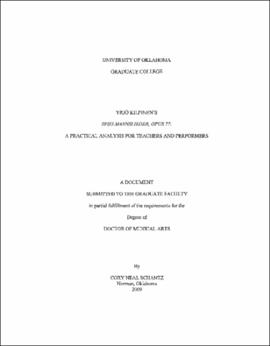| dc.contributor.advisor | Gates, Edward||Leffingwell, Dolores A | |
| dc.creator | Schantz, Cory Neal | |
| dc.date.accessioned | 2019-06-05T21:20:32Z | |
| dc.date.available | 2019-06-05T21:20:32Z | |
| dc.date.issued | 2009 | |
| dc.identifier | 9989696002042 | |
| dc.identifier.uri | https://hdl.handle.net/11244/320316 | |
| dc.description.abstract | Yrjö Henrik Kilpinen (1892-1959) wrote over nine hundred works encompassing multiple genres. It was his singular focus on the solo song, however, that established him as a preeminent composer of the genre. Kilpinen produced nearly eight hundred songs in three languages (Swedish, Finnish, and German), successfully pursuing the composition of the Klavierlied in a time when other prominent composers explored more expansive, orchestral forms. These engaging songs, particularly his German cycles, made him a composer of renown in Europe during the first half of the twentieth century. | |
| dc.description.abstract | This study of Spielmannslieder, Op. 77 provides biographical information about Kilpinen and poet of the cycle Albert Sergel (1876-1946), including new research detailing their connections to the Nazi party. It examines Kilpinen\'s compositional style through a musical and textual analysis of Spielmanns-Lieder. The musical analysis disputes some previously held beliefs about Kilpinen\'s style, while showing the influence of other significant composers of Lieder such as Schubert, Schumann, and Wolf. The study offers suggestions for the performance of each song and encourages the inclusion of Kilpinen\'s music in the standard vocal repertoire. | |
| dc.format.extent | 153 pages | |
| dc.format.medium | application.pdf | |
| dc.language | en_US | |
| dc.relation.requires | Adobe Acrobat Reader | |
| dc.subject | Music | |
| dc.title | YRJÖ KILPINEN'S SPIELMANNSLIEDER, OPUS 77: A PRACTICAL ANALYSIS FOR TEACHERS AND PERFORMERS | |
| dc.type | text | |
| dc.type | document | |
| dc.thesis.degree | D.M.A. | |
| ou.group | Weitzenhoffer Family College of Fine Arts::School of Music | |
